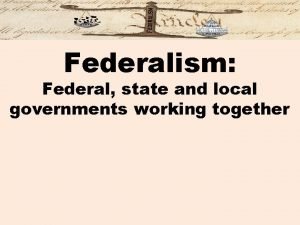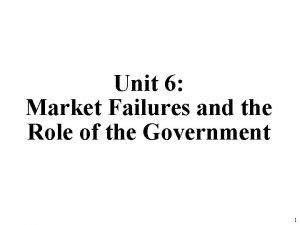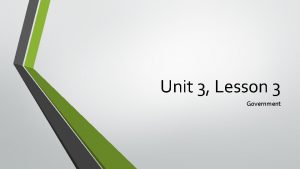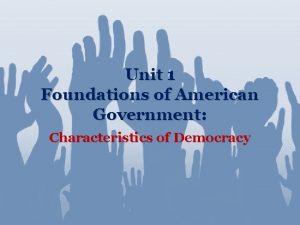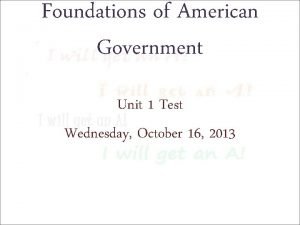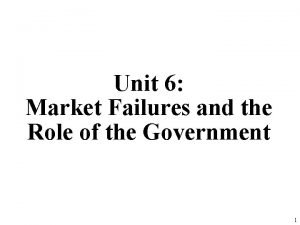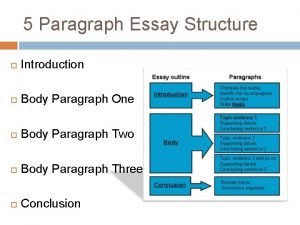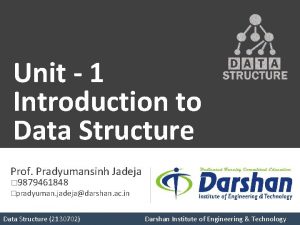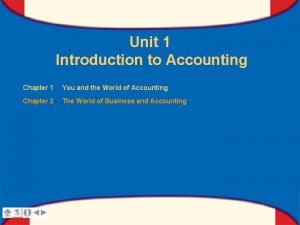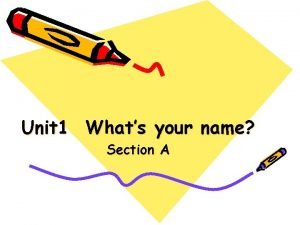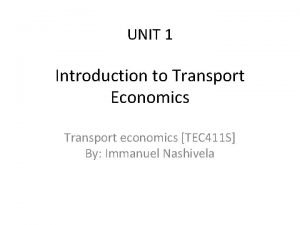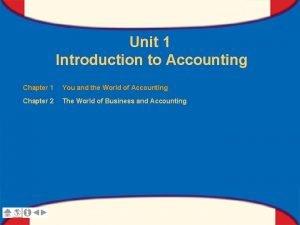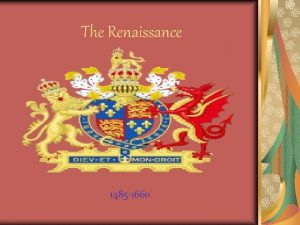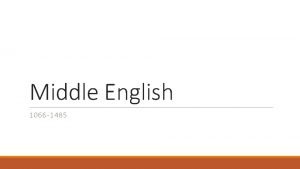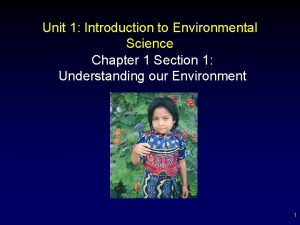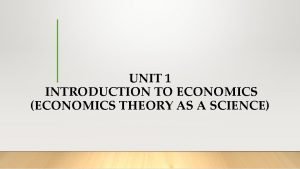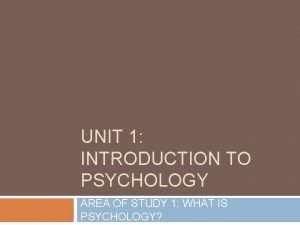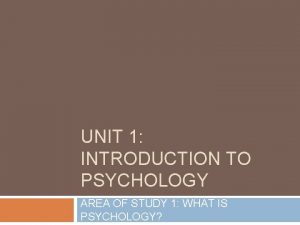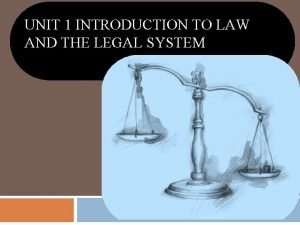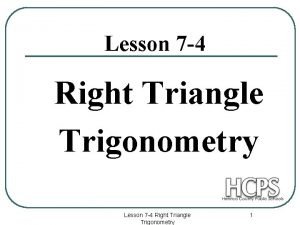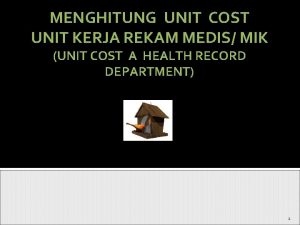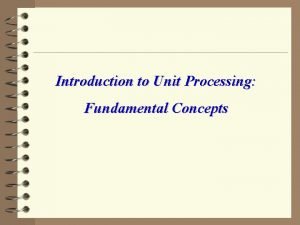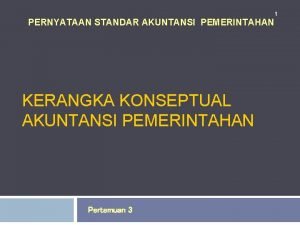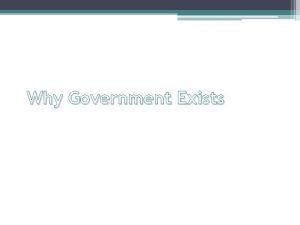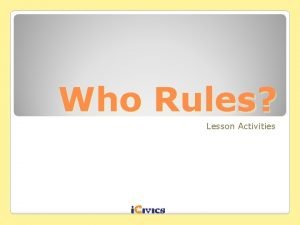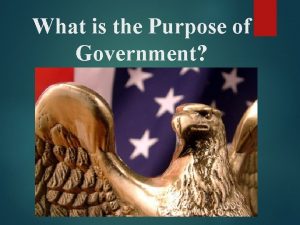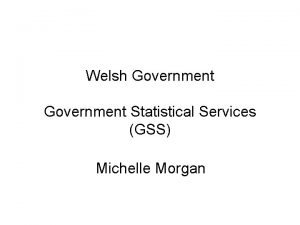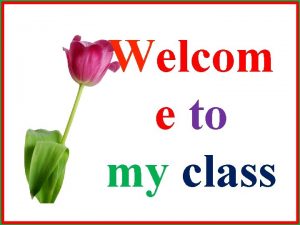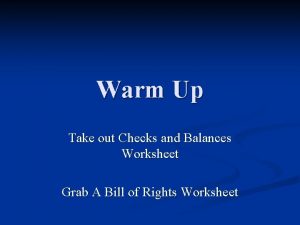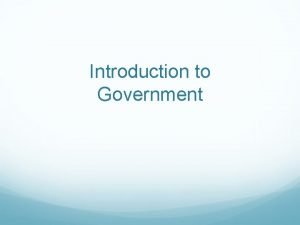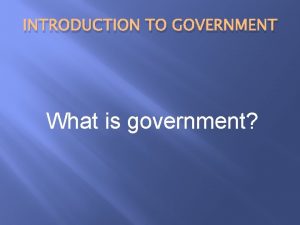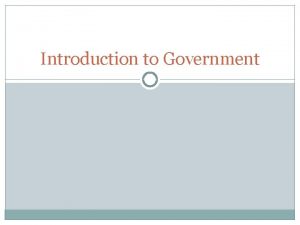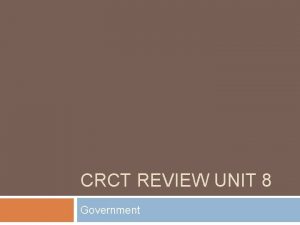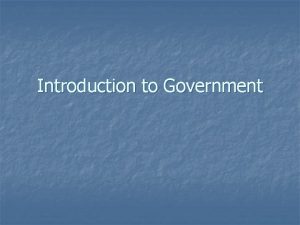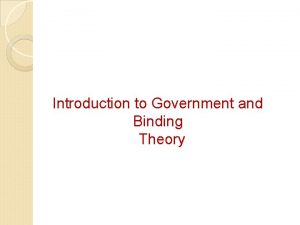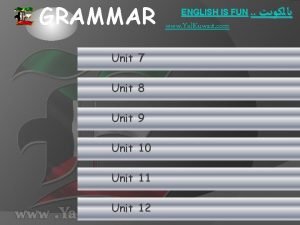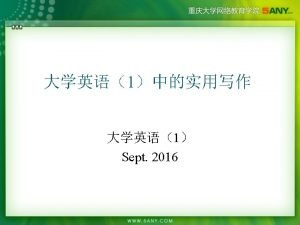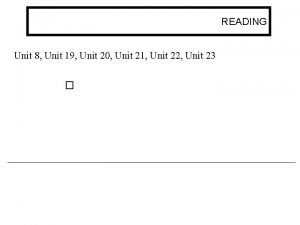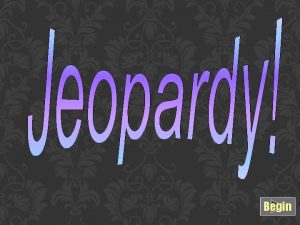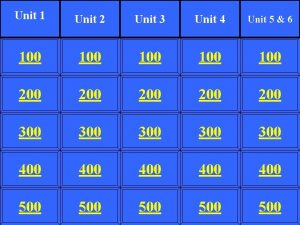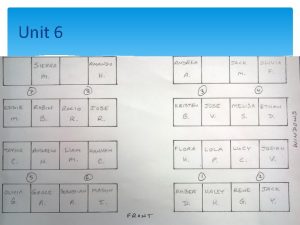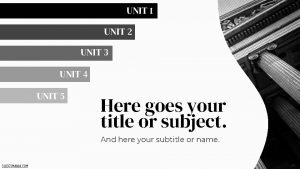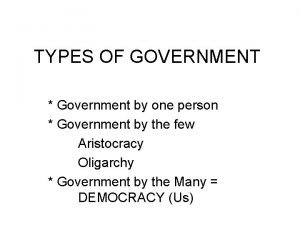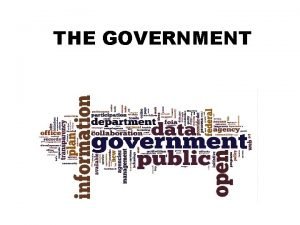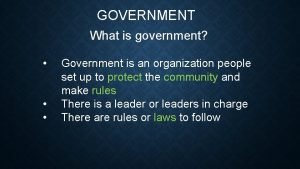A P Government Unit I Introduction to Government






































- Slides: 38

A. P. Government : Unit I Introduction to Government in America

What is government? An organization of people, offices, and processes, by which a state is ruled. The person or people who make the rules and enforce them. The people in charge of law-making and law enforcement.

What is a state? • A body of people, organized politically, who are sovereign. • Characteristics of a state: – Population – Territory – Government – Sovereignty

Sovereignty? • Final authority or power within the borders of a state. No outside agency or nation is making or enforcing policy for the state.

Why is government necessary? • Human Nature – Hobbes: man is evil, gov’t exists to protect us from our own nature – Locke: man is fallible, government is a choice used to protect the “good” from the “evil”

Why is government necessary? • Needs: – Protection • • • Foreign invasion Crime Natural Disasters Illness/Disease Etc…

Why is government necessary? • • Standardization Decision-making Rules/Laws Organization Economic Development Common moral standards/ political ideology Etc…

American Political Culture • As Americans, We believe in: – Individual Liberty – Equal Rights – Equality of Opportunity (not results) – Civic Duty

Government’s impact on daily life • • • Taxes! Traffic laws Education Standardized weights and measures Criminal law codes Guarantees of civil liberties/ rights Labor standards Licensing of Professionals Quality standards Protection/support for underprivileged Etc…

Theories of the origin of the state/government • Divine Right of Kings/ Divine Right Theory God gives certain people the right to rule. Treason is a sin.

• Force Theory One person or small group rule by military might.

• Evolution Theory Government evolved slowly over time. Family to clan to tribe to government

Social Contract Theory • Created by John Locke • Two Treatises on Civil Government – Natural Rights – Law of Nature – Government’s purpose is protection – Right to revolution – Consent of the people – Majority rule/minority rights – “contract” ; mutual obligations

Democracy A form of government in which the people are sovereign and the government guarantees rights to the people.

Forms of Democracy • Participatory Democracy: - emphasizes broad participation in politics and civil society - individual participation by citizens in political decisions and policies that affect their lives is done directly, not through elected representatives -also called Direct Democracy -Example: New England Town Meetings

• Pluralist Democracy – Recognizes group-based activism by nongovernmental interests striving for impact in policy making (interest groups/lobbyists) – Describes a political system where there is more than one center of power; power in dispersed or decentralized – An array of ideas are able to flourish within the political system – Pressure groups are a core part of this system – Also called Representative Democracy or Republic or Indirect Democracy


• Elite Democracy– Emphasizes limited participation in politics and civil society – A model of democracy in which small number of people, usually those who are wealthy or welleducated, influence political decision making – A theory of government and politics that contends that societies are divided along class lines and that an upper-class elite will rule, regardless of the formal documents that create the governmental structure – Also called Democratic Centralism

How do you know if your government is really a Pluralist Democracy? Do you have a written constitution? Does each adult have the right to vote? Are there regular, periodic, planned elections? Do you use secret ballots? Are there real choices on the ballot? Are people really guaranteed the right to speak, write, and associate? • Do people have religious freedom? • Do government officials have more rights than the people? • Are government officials answerable to the people? • • •

Systems of Government • Key is location of sovereignty (power) – Unitary: national government is sovereign; little or no local/regional government – Confederate: divided sovereignty; States are supreme – Federal: divided sovereignty; National government is supreme

Policy-Making Institutions • • Congress and Staff POTUS and EOP Bureaucracy Judiciary

Linkage Institutions • Connect the people to the government – Parties – Elections – Media – Interest groups

Political Power • Two essential questions: – Who governs? – To what ends? (why? )

Who Governs? • Who REALLY has the power? • Four Contending Theories: – Marxist – Elitist – Bureaucratic – Pluralist

Marxist Theory • Government is the tool of the wealthy. • Money=Power • Government is the servant of corporations

Elitist Theory • The “Elites” have the real power. • The Elites are the top corporate, political, labor, media, military, and educational leaders. • All the Elites have a similar background and education

Bureaucratic Theory • Government is really run by the career bureaucrats of the federal government. • Power is in the bureaucracy since they will remain in office for their entire working life. • Expertise=Power • Rule-making

Pluralist Theory • No one group has all the power all the time • There are too many interest groups, politicians, corporations, lobbyists, etc… for any one to maintain power over time.

To What Ends? Why? • Self Interest • Public Interest

Power • The ability to get someone to do what you want them to do • Examples?

Political Power • The ability to get someone to vote for you, support your policy or position, or to get them to do what you want in government.

Authority *General acceptance that one should be able to exercise a power

Legitimacy • The right to use power granted by constitution, law, or the people.

Four Kinds of Politics – Majoritarian – Interest Group – Client – Entrepreneurial

Majoritarian Politics • Costs and benefits of a policy are perceived to be widely distributed • Everyone receives benefits and everyone pays for benefits • Proposals for programs of this kind lead to intense ideological debates • Can result in a change in US world view if passed • Examples – – Social Security Medicare Obamacare World War II

Interest Group Politics • One groups pays for a program while another distinct group receives the benefits • Examples: – Public Education – Affirmative Action Programs – National Labor Relations Board

Client Politics • Costs of a program are paid by a majority of taxpayers while benefits are given to a small, well-organized group • Examples: – VA Benefits – Flood Control Projects – PORK! (gov’t research projects) – Earmarks

Entrepreneurial Politics • Benefits are perceived to be granted to the majority while a well-organized minority pays the costs • Need a compelling symbol; emotional plea • Media coverage (sympathy) is essential for success • Examples: – – Air and Water Quality Standards Investigation of Communists Brady Bill Meatpacking Regulations
 Unit 10, unit 10 review tests, unit 10 general test
Unit 10, unit 10 review tests, unit 10 general test What are the three levels of government
What are the three levels of government Introduction of parliamentary form of government
Introduction of parliamentary form of government Introduction to local government finance
Introduction to local government finance Unit 6 market failures and the role of the government
Unit 6 market failures and the role of the government Government unit 1 study guide
Government unit 1 study guide Letrs unit 3 lesson 3
Letrs unit 3 lesson 3 Unit 1 foundations of american government
Unit 1 foundations of american government Foundations of american government unit 1 test review
Foundations of american government unit 1 test review Unit 6 four market failures
Unit 6 four market failures Body paragraph
Body paragraph How to calculate time complexity in data structure
How to calculate time complexity in data structure Unit 1 introduction to accounting
Unit 1 introduction to accounting Whats your name bob
Whats your name bob Unit 1 introduction to logistics
Unit 1 introduction to logistics Unit 1 introduction to accounting
Unit 1 introduction to accounting Unit 1 economics
Unit 1 economics The renaissance 1485-1660
The renaissance 1485-1660 The middle ages 1066 to 1485 unit introduction
The middle ages 1066 to 1485 unit introduction Locard's exchange principle
Locard's exchange principle Unit 1 introduction to environmental science
Unit 1 introduction to environmental science Unit 1 introduction to economics
Unit 1 introduction to economics Unit 1 introduction to psychology
Unit 1 introduction to psychology Unit 1 introduction to psychology
Unit 1 introduction to psychology Unit 1 introduction to law and the legal system
Unit 1 introduction to law and the legal system Metode pembiayaan langsung (direct financing method)
Metode pembiayaan langsung (direct financing method) Hyp opp adj
Hyp opp adj Si vs english units
Si vs english units Unit test review algebra 2
Unit test review algebra 2 Contoh soal perhitungan unit cost rumah sakit
Contoh soal perhitungan unit cost rumah sakit Unit process and unit operation
Unit process and unit operation What is unit operation and unit process
What is unit operation and unit process Kerangka konseptual standar akuntansi pemerintahan
Kerangka konseptual standar akuntansi pemerintahan Confederation system of government
Confederation system of government Brazil form of government
Brazil form of government Purpose of government
Purpose of government Government statistical service
Government statistical service Welcom to my activity
Welcom to my activity Checks and balances worksheet
Checks and balances worksheet

